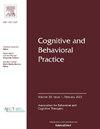创伤认知行为疗法和自我护理治疗创伤后应激症状并支持男男性行为者参与 HIV 护理:病例系列
IF 2.9
3区 心理学
Q1 PSYCHOLOGY, CLINICAL
引用次数: 0
摘要
迫切需要临床干预措施,以提高有创伤史的男男性行为者(MSM)对艾滋病毒护理的参与度。认知行为疗法(CBT)在治疗艾滋病毒感染者和艾滋病毒阴性男男性行为者的创伤后应激方面得到了实质性的支持。在这一人群中,创伤后反应既包括对与创伤相关的痛苦的一般回避,也包括对与HIV相关的刺激的特定回避,这些刺激会减少对HIV护理的参与。本论文介绍了创伤和自我护理认知行为疗法(CBT- tsc)的应用,它将CBT策略与Life-Steps框架相结合,以解决创伤后应激症状,这是一种基于证据的单次解决问题的干预措施,可增加抗逆转录病毒治疗的依从性。CBT的其他组成部分包括心理教育和减少特定的创伤症状,包括回避和消极的自我信念,这些都可能成为护理参与的障碍。干预是通过四个个案研究提出的。这些案例表明,CBT-TSC可用于支持有创伤史且在充分参与艾滋病毒护理方面面临障碍的艾滋病毒男同性恋者的精神健康和自我保健。本文章由计算机程序翻译,如有差异,请以英文原文为准。
Cognitive Behavioral Therapy for Trauma and Self-Care to Treat Posttraumatic Stress Symptoms and Support HIV Care Engagement Among Men With HIV Who Have Sex With Men: A Case Series
There is a strong need for clinical interventions that improve engagement in HIV care among men who have sex with men (MSM) with HIV who have histories of trauma. Cognitive behavioral therapy (CBT) has substantial support for treating posttraumatic stress among people with HIV and among HIV-negative MSM. In this population, posttraumatic responses can include both general avoidance of distress related to the trauma but also specific avoidance of HIV-related stimuli that can reduce engagement in HIV care. The present paper introduces an application of Cognitive Behavioral Therapy for Trauma and Self-Care (CBT-TSC), which integrates CBT strategies to address posttraumatic stress symptoms with the Life-Steps framework, an evidence-based, single-session problem-solving intervention that increases adherence to antiretroviral therapies. Other CBT components include psychoeducation and the reduction of specific trauma symptoms, including avoidance and negative self-beliefs that can act as barriers to care engagement. The intervention is presented via four individual case studies. These cases demonstrate the ways in which CBT-TSC can be used to support mental health and self-care among MSM with HIV who have histories of trauma and are facing barriers to full participation in HIV care.
求助全文
通过发布文献求助,成功后即可免费获取论文全文。
去求助
来源期刊

Cognitive and Behavioral Practice
PSYCHOLOGY, CLINICAL-
CiteScore
4.80
自引率
3.40%
发文量
118
审稿时长
84 days
期刊介绍:
Cognitive and Behavioral Practice is a quarterly international journal that serves an enduring resource for empirically informed methods of clinical practice. Its mission is to bridge the gap between published research and the actual clinical practice of cognitive behavior therapy. Cognitive and Behavioral Practice publishes clinically rich accounts of innovative assessment and diagnostic and therapeutic procedures that are clearly grounded in empirical research. A focus on application and implementation of procedures is maintained.
 求助内容:
求助内容: 应助结果提醒方式:
应助结果提醒方式:


